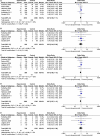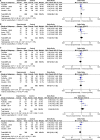Genetic association of TLR4 Asp299Gly, TLR4 Thr399Ile, and CD14 C-159T polymorphisms with the risk of severe RSV infection: a meta-analysis
- PMID: 26901241
- PMCID: PMC4814857
- DOI: 10.1111/irv.12378
Genetic association of TLR4 Asp299Gly, TLR4 Thr399Ile, and CD14 C-159T polymorphisms with the risk of severe RSV infection: a meta-analysis
Abstract
Respiratory syncytial virus (RSV) is the most frequent cause of hospitalization in infants worldwide. It is recognized by Toll-like receptor 4 (TLR 4) and cluster of differentiation 14 (CD14) in the innate immune response. Previous case-control studies reported the influence of TLR4 Asp299Gly, TLR4 Thr399Ile, and CD14 C-159T polymorphisms on the risk of severe RSV infection. However, a decisive conclusion has not been achieved. Therefore, we performed this meta-analysis to examine the association between these three polymorphisms and the development of RSV bronchiolitis. A systematic literature search was performed using the PubMed, EMbase, Google Scholar Search, China National Knowledge Infrastructure, China Biological Medicine, and Wanfang Databases. The data were extracted and pooled odds ratios with 95% confidence intervals were calculated under six genetic models. A total of six studies with 1009 cases and 1348 controls, three studies with 473 cases and 481 controls, or four studies with 325 cases and 650 controls relating to each of the three polymorphisms were included in this meta-analysis. The analyzed data indicated that all of these polymorphisms were not associated with the risk of severe RSV infection. This is the first meta-analysis to investigate the relationship of TLR4 Asp299Gly, TLR4 Thr399Ile, and CD14 C-159T polymorphisms with the risk of severe RSV infection. Although the results of this retrospective analysis indicated a lack of the association, more extensive multicentric studies with large sample sizes are necessary to provide a more reliable estimation of the association between these three polymorphisms and RSV bronchiolitis susceptibility.
Keywords: Asp299Gly; C-159T; CD14; RSV infection; TLR4; Thr399Ile; meta-analysis; polymorphisms.
© 2016 The Authors. Influenza and Other Respiratory Viruses Published by John Wiley & Sons Ltd.
Figures




Similar articles
-
The role of TLR4 and CD14 polymorphisms in the pathogenesis of respiratory syncytial virus bronchiolitis in greek infants.Int J Immunopathol Pharmacol. 2014 Oct-Dec;27(4):563-72. doi: 10.1177/039463201402700412. Int J Immunopathol Pharmacol. 2014. PMID: 25572736
-
CD14 C-159T and toll-like receptor 4 Asp299Gly polymorphisms in surviving meningococcal disease patients.PLoS One. 2009 Oct 7;4(10):e7374. doi: 10.1371/journal.pone.0007374. PLoS One. 2009. PMID: 19809507 Free PMC article.
-
Association between common Toll-like receptor 4 mutations and severe respiratory syncytial virus disease.J Infect Dis. 2004 Jun 1;189(11):2057-63. doi: 10.1086/420830. Epub 2004 May 12. J Infect Dis. 2004. PMID: 15143473
-
Lack of association between Toll-like receptor 4 gene Asp299Gly and Thr399Ile polymorphisms and tuberculosis susceptibility: a meta-analysis.Infect Genet Evol. 2013 Mar;14:156-60. doi: 10.1016/j.meegid.2012.11.009. Epub 2012 Nov 29. Infect Genet Evol. 2013. PMID: 23200920 Review.
-
Toll-like receptor 4 gene polymorphisms and susceptibility to colorectal cancer: a meta-analysis and review.Arch Med Sci. 2015 Aug 12;11(4):699-707. doi: 10.5114/aoms.2015.53288. Epub 2015 Aug 11. Arch Med Sci. 2015. PMID: 26322080 Free PMC article. Review.
Cited by
-
Inter-individual variation in health and disease associated with pulmonary infectious agents.Mamm Genome. 2018 Feb;29(1-2):38-47. doi: 10.1007/s00335-018-9733-z. Mamm Genome. 2018. PMID: 29353387 Free PMC article.
-
Recurrent Respiratory Syncytial Virus Infection in a CD14-Deficient Patient.J Infect Dis. 2022 Aug 24;226(2):258-269. doi: 10.1093/infdis/jiac114. J Infect Dis. 2022. PMID: 35429403 Free PMC article.
-
Post-bronchiolitis wheezing is associated with toll-like receptor 9 rs187084 gene polymorphism.Sci Rep. 2016 Aug 8;6:31165. doi: 10.1038/srep31165. Sci Rep. 2016. PMID: 27498757 Free PMC article.
-
Aims, Study Design, and Enrollment Results From the Assessing Predictors of Infant Respiratory Syncytial Virus Effects and Severity Study.JMIR Res Protoc. 2019 Jun 6;8(6):e12907. doi: 10.2196/12907. JMIR Res Protoc. 2019. PMID: 31199303 Free PMC article.
-
Human Genetic Determinants of Viral Diseases.Annu Rev Genet. 2017 Nov 27;51:241-263. doi: 10.1146/annurev-genet-120116-023425. Epub 2017 Aug 30. Annu Rev Genet. 2017. PMID: 28853921 Free PMC article. Review.
References
-
- Glezen WP, Taber LH, Frank AL, Kasel JA. Risk of primary infection and reinfection with respiratory syncytial virus. Am J Dis Child 1986; 140:543–546. - PubMed
-
- Kaan PM, Hegele RG. Interaction between respiratory syncytial virus and particulate matter in guinea pig alveolar macrophages. Am J Respir Cell Mol Biol 2003; 28:697–704. - PubMed
-
- Bradley JP, Bacharier LB, Bonfiglio J et al Severity of respiratory syncytial virus bronchiolitis is affected by cigarette smoke exposure and atopy. Pediatrics 2005; 115:e7–e14. - PubMed
Publication types
MeSH terms
Substances
LinkOut - more resources
Full Text Sources
Other Literature Sources
Medical
Research Materials

